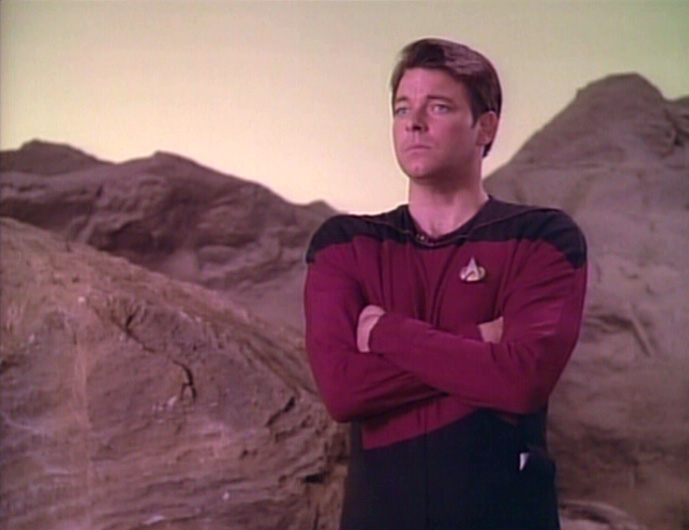If you’re a fan of any sci-fi TV show—and since you’re reading this blog I’m going to assume you’re a fan of at least one—you know about The Shaming.
The Shaming happens like this: You’re not bothering anyone; you’re just sitting there, watching a mediocre, or even outright bad episode of your show because, hey, it’s still Your Show, and you’re loyal to it, and Your Show at its worst is still light-years better than most people’s shows at their best; when who should walk into the room but that friend or family member you’ve been pleading with to give Your Show a try? And, as you cringe with dread, this potential “convert ” you’ve been working on actually sits down and pays attention to Your Show—and then looks at you with a blend of pity and scorn and says, “You actually like this stuff?” And you really have no defense because, let’s face it, with this episode, Your Show has let you down, and it’d be foolish to pretend otherwise.
When I was a youth, The Shaming hit me not once but twice with Star Trek. My mom was the one who caught me watching the less-than-stellar episode each time. The first time, a late-night repeat of “The Omega Glory” from the original series (a.k.a. The One Where Kirk Reads the Preamble to the U.S. Constitution) was the culprit.
My second Shaming came courtesy of “Hide and Q.”
 In 1987, when I was still enraptured with the mere existence of new weekly Trek, I thought this episode was top-notch. Like so many of the original series’ best hours, it was a futuristic morality play. It had some nice character moments, and, hey, Q was back, so bonus points for continuity. Having dutifully videotaped the thing, I was watching it for the sixth or so time that week (no joke, I pored over that first season the way I should be poring over the Bible) when Mom wandered in and sat down. Aha! I thought. Another chance! She’ll forget all that “E pleb nista” junk when she sees Star Trek at its finest! But after a minute or so, Mom said, “I don’t know. It’s an awful lot of talking.” And she left the room.
In 1987, when I was still enraptured with the mere existence of new weekly Trek, I thought this episode was top-notch. Like so many of the original series’ best hours, it was a futuristic morality play. It had some nice character moments, and, hey, Q was back, so bonus points for continuity. Having dutifully videotaped the thing, I was watching it for the sixth or so time that week (no joke, I pored over that first season the way I should be poring over the Bible) when Mom wandered in and sat down. Aha! I thought. Another chance! She’ll forget all that “E pleb nista” junk when she sees Star Trek at its finest! But after a minute or so, Mom said, “I don’t know. It’s an awful lot of talking.” And she left the room.
Shame!
Well, Mom was right (no great surprise there). “Hide and Q” is an awful lot of talking. And I know now that the ideas the characters spend so much time talking about have been handled far more elegantly, not just in Star Trek but in the vast genre of science fiction outside the franchise, of which I was mostly ignorant at the time
Even so, some of the episode’s talking entertains me even today:
http://www.youtube.com/watch?v=V–v5Ba_cx8
As you see, most of it reflects Gene Roddenberry’s relentlessly optimistic view of human progress and potential, the element of Star Trek that has always given me, as a Christian, the most pause. It’s not that I think we human beings shouldn’t do good things, or that we can’t grow as a species. It’s just that we don’t really ever seem to learn, not in the ways that matter most; a casual scan of any given day’s headlines provides ample evidence of this truth. We are a fallen race. G.K. Chesterton held that the doctrine of original sin—the teaching that, as the Heidelberg Catechism has it, the “disobedience of our first parents… has so poisoned our nature that we are born sinners—corrupt from conception on” (A. 7)—is “the only part of Christian theology which can really be proved.”
So while I ultimately can’t endorse Riker or Picard’s complete confidence in humanity’s inevitable progress toward perfection (although I do love listening to Sir Patrick recite that soliloquy!), I can appreciate this episode’s portrayal of temptation. True to its talky self, “Hi de and Q” mostly tells rather than shows the threat to Riker’s humanity (dare we say to his soul?) that Q’s power represents; about the darkest deed he does is to presumptuously call Picard “Jean-Luc.” Still, the episode’s theme tracks the story of “our first parents,” Adam and Eve, pretty closely. That crafty critter the snake (later interpreted as Satan) tells the first woman that she can eat the forbidden fruit with good cheer, for “you will be like God…” (Gen. 3.5). The fruit on that tree seemed “good for food, and… a delight to the eyes, and… to be desired to make one wise” (3.6)—it appeared beneficial, and beautiful, and valuable. But the snake’s “gift” gave only death, as surely as Riker would have “died” to humanity had he chosen to join the Q Continuum. (I don’t think it’s just a throwaway special effect that, in the episode’s teaser, Q first shows up as an “Aldebaran serpent!”)
de and Q” mostly tells rather than shows the threat to Riker’s humanity (dare we say to his soul?) that Q’s power represents; about the darkest deed he does is to presumptuously call Picard “Jean-Luc.” Still, the episode’s theme tracks the story of “our first parents,” Adam and Eve, pretty closely. That crafty critter the snake (later interpreted as Satan) tells the first woman that she can eat the forbidden fruit with good cheer, for “you will be like God…” (Gen. 3.5). The fruit on that tree seemed “good for food, and… a delight to the eyes, and… to be desired to make one wise” (3.6)—it appeared beneficial, and beautiful, and valuable. But the snake’s “gift” gave only death, as surely as Riker would have “died” to humanity had he chosen to join the Q Continuum. (I don’t think it’s just a throwaway special effect that, in the episode’s teaser, Q first shows up as an “Aldebaran serpent!”)
I once heard a professor or preacher quip that, classic doctrinal terminology aside, “When it comes to sin, there’s nothing original anymore!” His serious point, if breezily made, was that Eve and Adam’s sin in Eden is the paradigm for all sin. All sin, at some level, involves the confusion of creature and Creator, the misguided effort of human beings to become like God. Certainly, this is what Riker tries to do (egged on by Q, now cloaked in a medieval monastic cowl and pectoral cross—simple costume, or something more?) in the episode’s last act. I would call it the “dramatic” last act, except that, again, there’s so much talking! So we’ll settle for “climactic,” which is at least structurally accurate. You can watch it here (I know the video says “FULL,” but I’ve cued it to the last ten minutes or so):
http://youtu.be/FoxLsQKQE0s?t=35m8s
Q the tempter suggests and Riker the tempted seizes upon the idea that godlike power is the power to do or cause absolutely anything, with nothing more than a thought and a wave of the hand. Isn’t that the very definition of “omnipotence,” after all, God’s classical attribute of being all-powerful? And what could be more godly than the giving of gifts to friends? After all, is it not written that the one who descended and ascended, the Lord Jesus himself, “gave gifts to his people” (Eph. 4.8)?
But the crucified and risen Jesus gave (and gives) gifts “for the building up of the body of Christ” (4.12). Jesus’ gifts are not like Riker’s: individual wish-fulfillments like Wesley’s instant (and, sorry, none too handsome) adulthood, Geordi’s biological eyes, or Worf’s… um… “date.” Jesus’ gifts are not given to gratify us as individuals; they are precious resources for us to share with God’s people—and, indeed, with the whole world that God loves.
Q tempts Riker into believing that being godlike is no different than being Santa Claus. Jesus, in contrast, reveals that true divinity is not doing and giving anything and everything, but in giving oneself, as God gave himself in the life and death of his Son. “Give” is probably too weak a word; Paul’s letter to the early Christians in Philippi talks of Christ emptying himself, pouring himself out in obedience to God’s will for fallen humanity “to the point of death—even death on a cross” (Phil. 2.8). It’s not cleanliness that’s next to godliness: it’s self-giving, self-sacrificial humility for the genuine good of others.
Ironically, there is one point in this episode at which Riker really acts like the God we know in Jesus Christ—or at least comes very close. When Data and Dr. Crusher ask him if he can bring the young earthquake victim back to life, Riker briefly wrestles with the possibility, then says, “I can’t. I’m prevented from that by a promise.” The point of similarity is not in failing to restore the girl to life; it is in putting his promise to Picard (that he would not use the power of the Q, no matter how tempting) above the miracle Riker could perform, no matter how good it might be. God—the true God, the God of Israel, the God and Father of our Lord Jesus Christ—is a God who makes and keeps promises… a God who makes and keeps covenants, even when we break them… a God who does not break his word. And in Jesus Christ, God’s Word made flesh, God has promised and made covenant and vowed to be God for us.
And, in this sense, God is limited. God can’t do just anything and everything, whimsically, capriciously. God can and will do only what God chooses to do in order to save us—to lift us from our fallen state, to restore the image of God in which we were created, to bring us back into that life of loving fellowship with him for which we were made. God has chosen, from before the foundation of the world, to limit himself in this way for us and for our salvation. And this is good news! We do not need to worry that God will, in the end, turn out to be someone other than whom we meet in Jesus, “who died, yes, who was raised, who is at the right hand of God, who indeed intercedes for us” (Rom. 8.34). This is our God: the God who prevents himself, by a promise to himself and to us, from being anyone and anything other than who and what he will be to save us: from sin, from evil, from death…
…and even from all Shaming. The quality of Your Show will ebb and flow, but the promise–the Word–of our God will stand forever (Isa. 40.8). And if there is someone you want to pay attention to God’s promise to be God for us… well, there is always “a good episode on” as an introduction!
Next Week: One more from Season 1! Get ready to shed a tear for Tasha Yar as we ponder “Skin of Evil.”
Scripture quotations from the New Revised Standard Version.


I’ll have to watch this episode again for sure. Not sure if I’m going to do the rewatch, but I skipped this episode in my “Fan Collective Q Collection” because I remember it frustrating me. The truth of it is, while it’s been years since I watched this episode, I have a vague memory of frustration with this one. Like I sai,d I’ll have to rewatch it to see if I feel the same, but I have this vague impression that I was disappointed when Riker turned down the power and when his buddies turned down his gifts. Except Wesley — he DID need to live life, not jump ahead. That I understood. But as for the power, I’m trying to remember why I felt that way and can’t. I’ll come back after I watch this on Netflix . . .
Well, while Wesley may be the most obvious example, the truth is that all of Riker’s “gifts” were coming too easy. He offered to make Data human – but, as Data discovers over the course of TNG, it is the journey of becoming human that largely defines being human. He offers Geordi natural eyesight, but Geordi “doesn’t like who [he’d] have to thank” – ie., he knows (as I take it) that his eyes would be a “cheat,” unfairly obtained – yes, he wants normal eyesight (at this point in the series), but we established in the pilot that it would only come with the natural consequence of discomfort, surgery, etc. Worf rejects the potential mate because “there is no place for [sex] in his life” – odd, considering that next season he’ll get back together with K’Ehyler; but (apart from TNG Klingons still being ill-defined in season 1), I think we could read that, too, as something being handed to Worf ona platter, as opposed to being the product of a real relationship.
I would be interested, though, to know more about your disappointment with the episode, since it basically reaffirms Trek’s insistence that humans must work for what they enjoy (cf. Kirk’s closing speech in”This Side of Paradise”). The struggle is an inescapable part of being alive.
As always, though, thanks for reading and commenting!
Hey! I LIKED the Omega Glory!
Ah, well…
Well, as Kirk says in “The Trouble with Tribbles,” “There’s no accounting for taste…” (I kid! I kid!)
The Shaming! hahaha
I love The Omega Glory (particularly FOR Kirk’s waayyy dramatic reading), but I did get a taste of the shaming when I showed that clip to my wife. I was expecting tears, and got that awful, “Seriously?” face.
Hide and Q. I love the perspective you offer here. Riker’s Christ-like-ness does not come from the power or from the relinquishing of the power, but from the submission. How interesting! And since you mention it, I can’t see any other way around it. Christ’s mission – and submission under the authority that gave Him this mission – is a defining trait. He could have the power of Q or the weakness of an infant – His submission under the Father is the thing that remains!
I love it! Great job, Michael!
Thanks for the affirmations, Mickey! Yes, without his willing submission to and participation in the Father’s plan, the Son would just be a Q-like, tyrannical overlord. Time after time – the submission to his mother and adoptive father (Luke 2, after the Temple visit); his submitting to baptism at John’s hands in the Jordan (Matt. 3); his temptation by Satan in the wilderness; washing his disciples’ feet (John 13); the agony in Gethsemane – Jesus shows that he is “among [us] as one who serves” – serving us because, in so doing, he serves his Father.
On a lighter note, sorry I got all you “e pleb nista” fans out there riled up! 😉
Funny enough, TNG-shame was talked about on the last episode of the podcast — The Morality of Immortality.
Basically, Ben watched half of Encounter at Farpoint and now has the opinion of “how can anyone like Star Trek at all?” He came down pretty hard . . .
Ah, it’s not so bad as it’s made out to be, but neither will I defend it as the Greatest. Episode. Ever. (That’d have to be “Best of Both Worlds,” Part One!)
Well, Encounter at Farpoint is not the depths of TV wretchedness. It can be looked on fondly, mainly because there was NOTHING like it anywhere, and suddenly this was around for us. The couple of seasons it took to build up into something exciting we were more than forgivable, because there was still nothing else like it. We didn’t care that those first two seasons were slow, because it was all we had. Meanwhile, the characters were filling out, the writers were figuring out what they were doing, and Patrick Stewart & Brent Spiner. By the time there WAS other stuff to compete with it, it had grown into one of television’s finest series. So I look at Encounter with a lot of fondness because of what it started.
And honestly: no Encounter at Farpoint, no DS9, no Battlestar, no Babylon 5, no Farscape . . . etc.
Oh, and I’d argue that the Greatest. Episode. Ever. goes to All Good Things.
Great article.
*** Service freezed. Please extend limit at the Control panel. Request number 0e4a9437344943fe0a4a525391477783. Automoderator cleantalk.org. ***